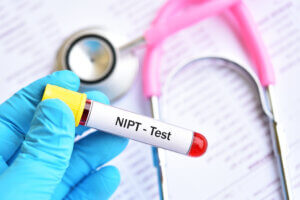NIPT + Scan
Non-Invasive Prenatal Testing (9-40 Weeks)

- Analyses cell-free DNA in maternal blood
- Determines probability of Down's Syndrome
- Gender confirmation upon request

The NHS offers combined testing for Down’s syndrome (Trisomy 21), Edward’s syndrome (Trisomy 18) and Patau’s syndrome (Trisomy 13) at 10-14 weeks. If you are considering this testing or have already had it, stats indicate that 1 in 30 women may receive a high-risk result.
If you fall into the high-risk category, you may have been advised to have an amniocentesis or chorionic villus biopsy (CVS) to assess your baby’s chromosome pattern. The possibility of miscarriage from this test is approximately 1%.
For this reason, NIPT testing is becoming increasingly popular. It has the best detection rate of all screening tests; it estimates the risk of your baby having common chromosome conditions called a trisomy – the most common of which are Trisomy 13, 18 and 21. The detection rate is more than 99% accurate.
Whilst NIPT testing is not classed as a diagnostic test like amniocentesis or chorionic villus biopsy (CVS), it carries no risk of miscarriage. It is, therefore, safe for your pregnancy whilst providing the highest degree of accuracy. NIPT testing provides parents peace of mind and allows them to make the appropriate decisions where further testing might be required.
At Bodyvie, we work with various accredited laboratories to process NIPT samples, all of which have excellent detection rates.
The NIPT tests vary and provide different specificities, sensitivities and screening panels. The cost, turn-around time, and redraw rate will vary according to the NIPT test that is most suitable for you.
Your sonographer or a trained phlebotomist will take a sample of maternal venous blood from the mother’s arm, and the NIPT is combined with an ultrasound scan to confirm pregnancy. NIPT detects cell-free fetal DNA (cfDNA) in the mother’s bloodstream using next-generation sequencing technology coupled with advanced bioinformatics analysis.
NIPT testing can also provide an optional analysis of the X and Y sex chromosomes, thus providing accurate gender confirmation. The accuracy of gender determination using NIPT is greater than 98%, but we always advise having the gender checked at your 20-week ultrasound anatomy scan.
For most women, results will return as ‘low risk’, meaning it is very unlikely that the baby has one of these trisomy conditions. However, they cannot all be ruled out as there is a very small risk that not all trisomy foetuses will be detected.
A ‘high risk’ result indicates a very high chance of your pregnancy being affected by a trisomy condition. However, it does not definitely mean your baby will be affected. Overall the test identifies more than 99% of T21, T18 and T13 pregnancies. An amniocentesis or CVS screening test is generally advised to confirm the result if you receive a positive result.
*Gives you an optional glimpse of your baby in 4D scan mode (dependent on the baby being in a good 4D position)
The Harmony® prenatal test, also known as NIPT, is a non-invasive way to screen for common chromosomal conditions like Down syndrome (trisomy 21), Edwards syndrome (trisomy 18), and Patau syndrome (trisomy 13) as early as 10 weeks into your pregnancy. By analysing fragments of your baby’s DNA in your blood, this test can provide accurate insights into your baby’s health.
It’s important to note that chromosomal conditions can occur in any pregnancy, regardless of family history, as they are typically not inherited. The results of your prenatal screening can give you specific information about your pregnancy, allowing for more informed discussions about your prenatal care.
With the Harmony prenatal test, you also have the option to find out the the gender of your baby.

The Panorama NIPT test can be carried out from as early as 9 weeks and is the most ordered NIPT, trusted in more than 3 million pregnancies. This simple blood test can assess conditions that can affect your baby’s health. Panorama™ offers prenatal screening for twin, egg donor, and gestational carrier pregnancies.
The price is the same if you request the additional option of including Panorama™ with foetal sex and/or the sex chromosome aneuploidy panel. The additional cost is applied when testing for the base panel (Trisomy 21,18 & 13) plus 22Q11.2 deletion syndrome (DiGeorge Syndrome or Velo-Cardio-Facial syndrome (VCFS)), or base panel (Trisomy 21,18 & 13) plus 5 microdeletions.
Panorama™ is also the only NIPT that tests for Triploidy. Turn-around time is approximately 7-10 business days in most cases.
Unsure about Panorama? Schedule your genetic information session here
![]()
Our sonographers are here to provide comprehensive guidance on which test will be most suitable for you. All NIPT testing is offered alongside an ultrasound scan. If you wish to book, please get in touch with us, and we will be happy to help.
NIPT (Non-Invasive Prenatal Testing) is typically conducted during pregnancy between 9 to 40 weeks gestation, offering an early glimpse into your baby’s genetic profile.
Studies have shown that NIPT has a high sensitivity and specificity for common chromosomal abnormalities such as Down syndrome (trisomy 21), trisomy 18, and trisomy 13. The detection rate is more than 99% accurate. This means that NIPT can accurately identify the vast majority of pregnancies affected by these chromosomal abnormalities, while also minimising the risk of false positive results.
It’s important to note that NIPT is currently offered by the NHS only to women who have received a screening blood test result (such as the NHS combined or quadruple test) indicating a high likelihood of fetal trisomy.
However, for those seeking NIPT without meeting NHS criteria, it is recommended to consider private clinic options.

Ⓒ Bodyvie Limited 1999 - 2024 All rights reserved. All trademarks acknowledged.
Company number 3849113